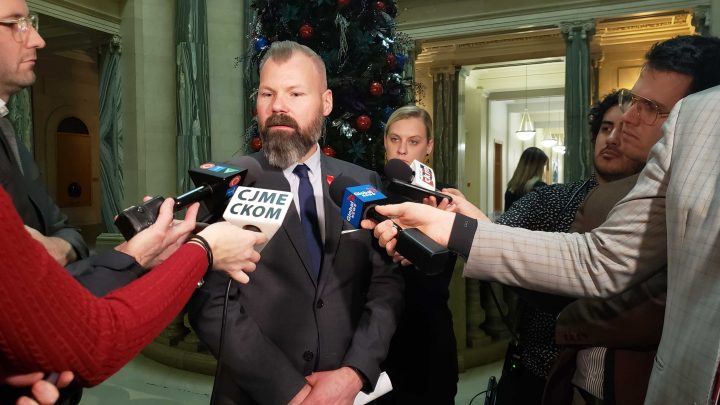
The goal is to help provide emission-free power in the move away from fossil fuel-burning electricity. However, the minister responsible for SaskPower said Saskatchewan still has a lot to learn about the technology before making concrete plans.
“An SMR is not imminent for Saskatchewan, but I would say it is probably within the middle part of the next decade we would likely see the first SMR in North American south of the border,” Dustin Duncan said.
“What I understand from Ontario and New Brunswick, they could be soon after that, within the next decade. So I think it is coming, still lots to learn about it, but that’s part of what our MOU is.”
Possible locations for SMRs in Saskatchewan could be the southeast corner around Estevan or Coronach and the north.

Get daily National news
Duncan said this is due to an abundance of transmission infrastructure attached to coal plants that will be decommissioned in the south, and electricity needs in the north due to many homes using it for heating.
- Michael Kovrig reflects on ‘brutally hard’ Chinese detention: ‘You’re totally alone’
- Conservatives set to table non-confidence motion Tuesday. What to expect
- After controversial directive, Quebec now says anglophones have right to English health services
- TD Bank moves to seize home of Russian-Canadian jailed for smuggling tech to Kremlin
However, the federal process to approve a potential nuclear site is lengthy.
“Obviously New Brunswick and Ontario are ahead of Saskatchewan because they already have nuclear power sites; they’re already licensed to host a nuclear site,” Duncan said.
“We don’t have a site at this point. Our first step would be to really get a better sense of the technology.”
Duncan said this MOU signed between the premiers builds on a pre-existing agreement between Saskatchewan and Ontario’s power corporations.
This has Opposition Leader Ryan Meili saying the agreement is interesting for not being interesting.
“It looks like another photo op for Scott Moe and Doug Ford. They brought in New Brunswick this time, but it doesn’t seem to give any real details,” Meili said.
Meili added there are many questions around what this will cost and the MOU is light on those details.
“Right now, I think this MOU adds almost nothing to the conversation,” Meili said.
The NDP leader said he does think SMRs are worth exploring and it could be a good way to get more value for Saskatchewan uranium.
A small team at SaskPower is currently working on what it would take to add SMRs to the grid.
The premiers of Saskatchewan, Ontario and New Brunswick have all been vocal opponents of the federal carbon tax.
Moe has said the carbon tax won’t generate meaningful emission reductions in Saskatchewan, and technological advancements are the way to get more meaningful reductions.
Federal officials have said the goal of the carbon price is to change behaviour.
Despite Saskatchewan eyeing a major shift in baseload power generation, Duncan said he does not believe this is a signal the carbon tax is changing behaviour.
“When you look at individuals that are paying the carbon tax, again ss I’ve argued in the past, certainly we don’t think it’s going to see a change in behaviour,” Duncan said.
“That being said, as a utility we know we have large-scale generation that needs to be replaced. Certainly, coal beyond 2030 without carbon capture is not going to be allowed in Canada, but even natural gas has additional costs attached to it through a carbon tax.”
A decision on whether or not to expand carbon capture technology to extend the life of the coal-fired Shand Power station is still years away.
SaskPower previously paused the development of a new natural gas power station near Moose Jaw due to changing carbon tax regulations. The Crown utility ultimately decided to move ahead despite an extra $350 million in estimated costs.








Comments